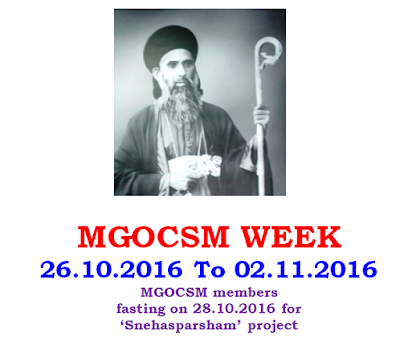Friday, 28 October 2016
Tuesday, 25 October 2016
Sunday, 23 October 2016
FASTING & ABSTINENCE
Fasting and
abstinence
Fasting in the Malankara Orthodox Syrian
tradition
It
is widely known that the Orthodox Churches give much importance to fasting,
following the example of Jesus Christ and of the apostolic community.
The noun fasting means non-eating and non-feeding.
The noun fasting means non-eating and non-feeding.
But
every non-eater is by no means is a faster and everyone who is an eater and
restrains himself by an interior dedication from nourishment because of
heavenly things is a faster.
In
our materialistic society we learn to identify ourselves through
self-indulgence and we tend to see the fasting only as a time of deprivation
and penance. But this is not at all the view of the Orthodox Church on fasting
and abstinence and it is clearly explained by the Fathers in their spiritual
discourses.
For them, fasting is the feast of the soul and
good fasts are like medicine which cures our soul and mind, and, along with
other virtuous works, it leads us to the eternal life.
In our spiritual battle, fasting protects us
from the evil one. It not only resists the attack but also trains our body and
mind for the battle. According to Mar Aprem (4th Century Church Father) fasting
is a great weapon against the evil one. Through fasting Christ defeated the
Satan and has given us this weapon to overcome the evil. For Philixenus of
Maboug (6th century Church Father), fasting and abstinence are the two virtuous
weapons for cultivating the field of Christian life.
‘Fasting
must be undertaken voluntarily and it must be of divine dispensation’. This is
the primary teaching of our Church on Fasting. Fast is of free will and
it is the voluntary fast which is accessible and permanent. Fasting becomes
highly acceptable when it is joined with humility of hearts, charity towards
all men and continuous prayers.
The
Lenten prayers and liturgy of our Church extols this kind of fasting by giving
the Old Testament figures as good examples (Moses, Daniel, Elijah etc.).
Fasting is the root by which all the fruits of sanctity are sustained and on
this same root grows purity, delights virginity and rejoices patience. Fasting
dispels immodesty, controls the lust and offers the body as a holy temple of
God.
Therefore,
the Church exhorts the faithful to love and practice this highly acceptable
form of Christian life so that it may lead them to the great eternal fast which
is going to happen in the eternal bride chamber of life. Through it, the
strength of the soul is confirmed, the riches of the body are increased and
good aspirations aroused in the heart.
Source:
www.mosc.in
Thursday, 20 October 2016
Wednesday, 19 October 2016
Sunday, 16 October 2016
Wednesday, 12 October 2016
Tuesday, 11 October 2016
Monday, 10 October 2016
Sunday, 9 October 2016
Thursday, 6 October 2016
Subscribe to:
Comments (Atom)

















